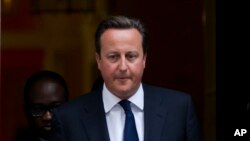LONDON —
Britain’s leader will still push for a “robust response” in Syria, despite parliament rejecting any military action against the Syrian government. David Cameron said Friday he “regrets” the outcome of the vote.
Cameron was speaking Friday after the British parliament gave its "no" vote late Thursday.
“Parliament I think made a very clear view which it does not want British involvement in military action so we will proceed on that basis,” he said.
Cameron had sought authorization for a military strike to “deter and prevent” the Syrian authorities from using poison gas. The measure was defeated by a vote, 285 -272.
Cameron said Friday it’s still important for Britain to make a “robust response” to the use of chemical weapons - and by using channels such as the United Nations and NATO, Britain would “condemn what’s happened in Syria.”
*as of 8/30/13
Earlier this week, Britain drafted a Security Council resolution that would authorize the use of “all necessary force” in reaction to the Syrian government's alleged use of chemical weapons.
But the Council’s five permanent members - Russia, China, the United States, France and Britain - have been in deadlock during meetings this week.
The leader of Britain’s opposition, Ed Miliband, said the British response to the Syrian crisis must be calm and measured.
"I think the problem is that David Cameron was engaging in cavalier and reckless leadership and it was cavalier and reckless leadership that was taking Britain potentially into war without going through the United Nations, without putting the evidence properly before the British parliament,” he said.
The United States and a number of its allies said the Syrian government carried out a chemical weapons attack near Damascus last week that reportedly killed hundreds of people. The Syrian government denied the allegations.
On Friday French President Francois Hollande said he still supported taking “firm” action in Syria despite the British "no" vote. Hollande does not need parliamentary approval for a military strike, as long as the campaign lasts less than four months.
Germany said it would not take part in military action. Foreign Minister Guido Westerwelle told journalists that participation in a strike was “not being considered."
Cameron was speaking Friday after the British parliament gave its "no" vote late Thursday.
“Parliament I think made a very clear view which it does not want British involvement in military action so we will proceed on that basis,” he said.
Cameron had sought authorization for a military strike to “deter and prevent” the Syrian authorities from using poison gas. The measure was defeated by a vote, 285 -272.
Cameron said Friday it’s still important for Britain to make a “robust response” to the use of chemical weapons - and by using channels such as the United Nations and NATO, Britain would “condemn what’s happened in Syria.”
World Powers Stance on Syria
Where World Powers Stand on Syria*as of 8/30/13
- Britain: Parliament rejects participation in military strike
- Russia: Against Western intervention
- France: President wants "firm and proportionate action"
- China: Foreign Minister says political resolution is "only way out"
- Germany: Military commitment is not being considered
- Italy: Will not take part in military action without a U.N. mandate
- Canada: Supports intervention but no plans to commit Canadian forces
- Iran: Opposed to any Western military strike
But the Council’s five permanent members - Russia, China, the United States, France and Britain - have been in deadlock during meetings this week.
The leader of Britain’s opposition, Ed Miliband, said the British response to the Syrian crisis must be calm and measured.
"I think the problem is that David Cameron was engaging in cavalier and reckless leadership and it was cavalier and reckless leadership that was taking Britain potentially into war without going through the United Nations, without putting the evidence properly before the British parliament,” he said.
The United States and a number of its allies said the Syrian government carried out a chemical weapons attack near Damascus last week that reportedly killed hundreds of people. The Syrian government denied the allegations.
On Friday French President Francois Hollande said he still supported taking “firm” action in Syria despite the British "no" vote. Hollande does not need parliamentary approval for a military strike, as long as the campaign lasts less than four months.
Germany said it would not take part in military action. Foreign Minister Guido Westerwelle told journalists that participation in a strike was “not being considered."




